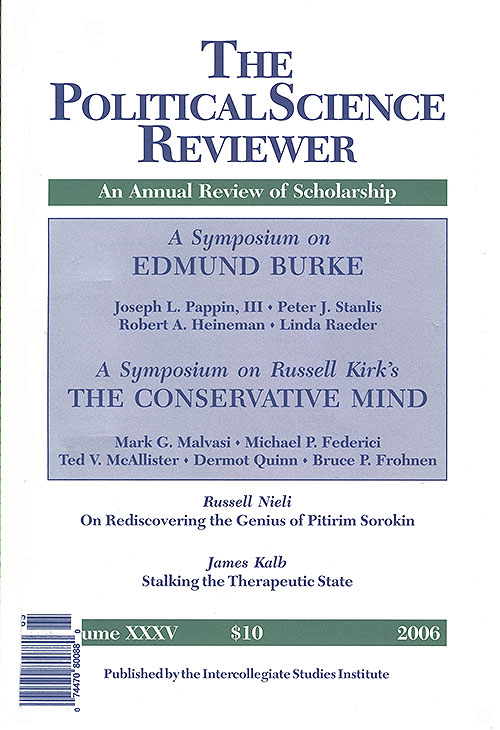Keywords
How to Cite
Abstract
Edmund Burke is recognized by most modern conservatives asthe founding father of conservative political philosophy. Infact, it is practically inescapable for those who claim to beconservatives that they recognize Burke as the fountainhead ofconservatism. For the most part the Reflections on the Revolutionin France is cited as the seminal text, with its emphasis uponorder, custom, just prejudice, historical precedent, and prescriptiverights in the face of radical Jacobinism. Burke's rage againstthe French philosophes such as Rousseau, Voltaire, and Diderotwas in large part due to their rejection of religion, property, andconstitutional monarchy and their embrace of fanatical atheism,as he regarded their ultimate foundation. Burke's stance, based onsolid principles of justice and tradition, and also reflecting naturalsentiments of respect for the manners and habits of an orderedsociety, seems to have a transparency that is clear to all.
Similar Articles
- Linda C Raeder, Edmund Burke , The Political Science Reviewer: Vol. 35 (2006): Symposia on Edmund Burke and on Russell Kirk’s <em>The Conservative Mind</em>
- Burke A. Hendrix, Edmund Burke, Native Americans, and the Burkean Imagination , The Political Science Reviewer: Vol. 42 No. 1 (2018): Symposium: Philosophy in Weimar Germany
- Ross Carroll, Edmund Burke, Imperialist Ideologue? , The Political Science Reviewer: Vol. 42 No. 1 (2018): Symposium: Philosophy in Weimar Germany
- Lida Maxwell, Burke, Cultural Difference, and the Problem of Imperial Critique , The Political Science Reviewer: Vol. 42 No. 1 (2018): Symposium: Philosophy in Weimar Germany
- Ted V McAllister, What Does Burke Have to Do With America? , The Political Science Reviewer: Vol. 40 (2016): A Symposium on Paul Gottfried’s Conservatism in America
- Brandon Turner, O’Neill on Burke’s Not-Particularly- Conservative Logic of Empire , The Political Science Reviewer: Vol. 42 No. 1 (2018): Symposium: Philosophy in Weimar Germany
- Onur Ulas Ince, Political Economy and Edmund Burke’s (Il)Liberal Logic of Empire , The Political Science Reviewer: Vol. 42 No. 1 (2018): Symposium: Philosophy in Weimar Germany
- Robert A Heineman, Edmund Burke and the American Nation , The Political Science Reviewer: Vol. 35 (2006): Symposia on Edmund Burke and on Russell Kirk’s <em>The Conservative Mind</em>
- William F Byrne, Edmund Burke and the Politics of Empire , The Political Science Reviewer: Vol. 37 (2008): Symposium: The Life and Work of Michael Polanyi
- Onur Ulas Ince, Burke A. Hendrix, Lida Maxwell, Ross Carroll, Brandon Turner, Daniel I. O’Neill, Author Meets Critics , The Political Science Reviewer: Vol. 42 No. 1 (2018): Symposium: Philosophy in Weimar Germany
You may also start an advanced similarity search for this article.
Most read articles by the same author(s)
- Raph C Hancock, What Was Political Philosophy? Or , The Political Science Reviewer: Vol. 36 (2007): A Symposium on Leo Strauss and His Students
- Paul Wilford, Rachel K. Alexander, Eryn Gammonley, Jacob C.J. Wolf, Samuel Goldman, James Patterson, Symposium on James M. Patterson's Religion in the Public Square: Sheen, King, Falwell , The Political Science Reviewer: Vol. 45 No. 1 (2021): Symposium: Music in Plato's Political Thought
- Richard L Velkley, Being and Politics , The Political Science Reviewer: Vol. 34 (2005): Eric Voegelin’s <em>New Science of Politics</em>: A 50th Anniversary Symposium
- Thomas McDonald, Richard H. Kennington (1921–1999) , The Political Science Reviewer: Vol. 30 (2001): Symposia on Kant Studies and on <em>I’ll Take My Stand</em>
- Walter Gulick, Michael and Karl Polanyi , The Political Science Reviewer: Vol. 37 (2008): Symposium: The Life and Work of Michael Polanyi
- Mark Nugent, Willmoore Kendall and the Deliberate Sense of the Community , The Political Science Reviewer: Vol. 36 (2007): A Symposium on Leo Strauss and His Students
- Walter Nicgorski, Politics, Political Philosophy, and Christian Faith , The Political Science Reviewer: Vol. 31 (2002): A Symposium on Gerhart Niemeyer
- Michael Franz, The Concept of Gnosticism and the Analysis of Spiritual Disorder , The Political Science Reviewer: Vol. 34 (2005): Eric Voegelin’s <em>New Science of Politics</em>: A 50th Anniversary Symposium
- Ross Lence, Jefferson and The Declaration of Independence , The Political Science Reviewer: Vol. 6 (1976): Reviews
- Ryan McKinnell, To Imitate the Ancients in the Hard Things or the Soft , The Political Science Reviewer: Vol. 43 No. 1 (2019): Essays
